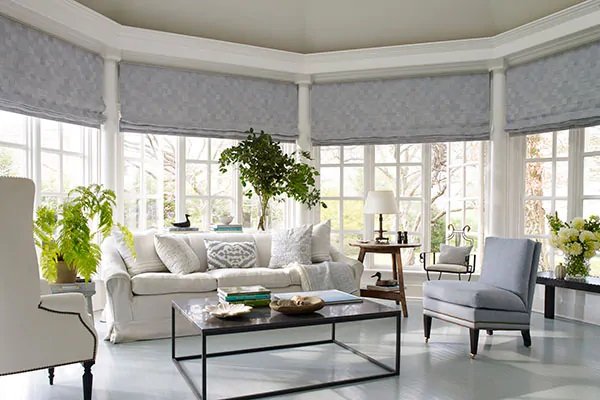A sunroom is a delightful addition to any home, offering a bright, airy space that allows you to enjoy natural light while staying sheltered from the elements. However, choosing the right window coverings for a sunroom can be tricky. The goal is to manage sunlight effectively while maintaining the room’s openness and style. Depending on your needs, there are a variety of options that can enhance the aesthetics of your sunroom while providing privacy, light control, and protection from harmful UV rays. In this article, we’ll explore some of the best window covering options to help you make an informed choice.
If you’re looking for expert guidance, these tips for selecting sunroom curtains can also offer valuable insights.
1. Cellular Shades: Energy-Efficient and Stylish
Cellular shades, also known as honeycomb shades, are a fantastic option for sunrooms because of their energy efficiency. They are designed with a unique structure that traps air, providing insulation that can keep your sunroom cooler during hot summer months and warmer during the winter. This insulating property helps reduce your energy bills while also filtering out harsh sunlight.
Available in a wide range of colors and opacities, cellular shades allow you to choose the amount of light and privacy you desire. The light-filtering options soften incoming light, creating a warm, inviting atmosphere without glare. For complete privacy and UV protection, you can opt for blackout cellular shades.
Pros:
Excellent insulation
Great light control options
Variety of color choices
Cons:
Can be more expensive than simpler window treatments
2. Solar Shades: Perfect for UV Protection
Solar shades are designed specifically to block harmful UV rays while allowing natural light to filter into your sunroom. These shades are perfect if you want to maintain your outdoor views while reducing heat and protecting your furniture and flooring from sun damage. Solar shades come in varying openness levels, which indicate how much light can pass through. A higher openness factor means more light and visibility, while a lower factor offers more privacy and light blocking.
Since sunrooms are typically exposed to a lot of sunlight, solar shades provide an excellent balance between sun protection and maintaining a bright, cheerful space. They are sleek and modern, making them a great choice for contemporary sunroom designs.
Pros:
UV protection for furniture and flooring
Maintain outdoor views
Sleek and minimalistic appearance
Cons:
Limited privacy at night when interior lights are on
3. Plantation Shutters: Timeless Elegance
For a more classic, elegant look, plantation shutters are a top choice for sunroom window coverings. These shutters are typically made from wood or composite materials and feature wide louvers that can be adjusted to control light and airflow. Plantation shutters are highly durable and can withstand years of sun exposure without fading or warping.
One of the major benefits of plantation shutters is their flexibility. You can adjust the louvers to let in the perfect amount of light or close them completely for privacy. They also offer excellent insulation, helping to regulate the temperature in your sunroom.
Pros:
Durable and long-lasting
Timeless and stylish design
Great light and privacy control
Cons:
Higher cost
Can be bulky for smaller windows
4. Roman Shades: Soft and Sophisticated
Roman shades are a soft, fabric window covering that adds an element of sophistication to your sunroom. These shades are made from fabric that folds into neat pleats when raised, creating a clean, elegant look. Roman shades are available in a wide variety of fabrics, colors, and patterns, allowing you to customize them to fit your sunroom’s décor.
Depending on the fabric you choose, Roman shades can offer excellent light control, from sheer fabrics that gently filter light to blackout fabrics that provide complete privacy and darkness. They are also a great way to add texture and warmth to your sunroom.
Pros:
Wide variety of fabric choices
Adds softness and warmth to the room
Versatile light control options
Cons:
Fabric can fade over time with excessive sun exposure
May require more frequent cleaning
5. Blinds: Affordable and Functional
Blinds are a versatile and affordable option for sunroom window coverings. Available in a variety of materials such as wood, faux wood, aluminum, and vinyl, blinds offer a wide range of styles and finishes to suit any décor. With adjustable slats, blinds give you full control over the amount of light entering your sunroom.
Wood and faux wood blinds are particularly popular in sunrooms for their natural look and durability. Faux wood blinds, in particular, are resistant to moisture and won’t warp or crack in humid environments, making them ideal for sunrooms that experience varying temperatures.
Pros:
Affordable and widely available
Wide range of materials and styles
Easy to adjust for light and privacy
Cons:
Less insulation compared to shades
May not offer as much aesthetic appeal as other options
Conclusion
When choosing window coverings for your sunroom, it’s important to consider both functionality and style. From the energy-efficient cellular shades to the timeless beauty of plantation shutters, each option has its unique benefits. Whether you prioritize UV protection, insulation, or light control, there’s a window covering solution that will enhance your sunroom’s comfort and charm.
